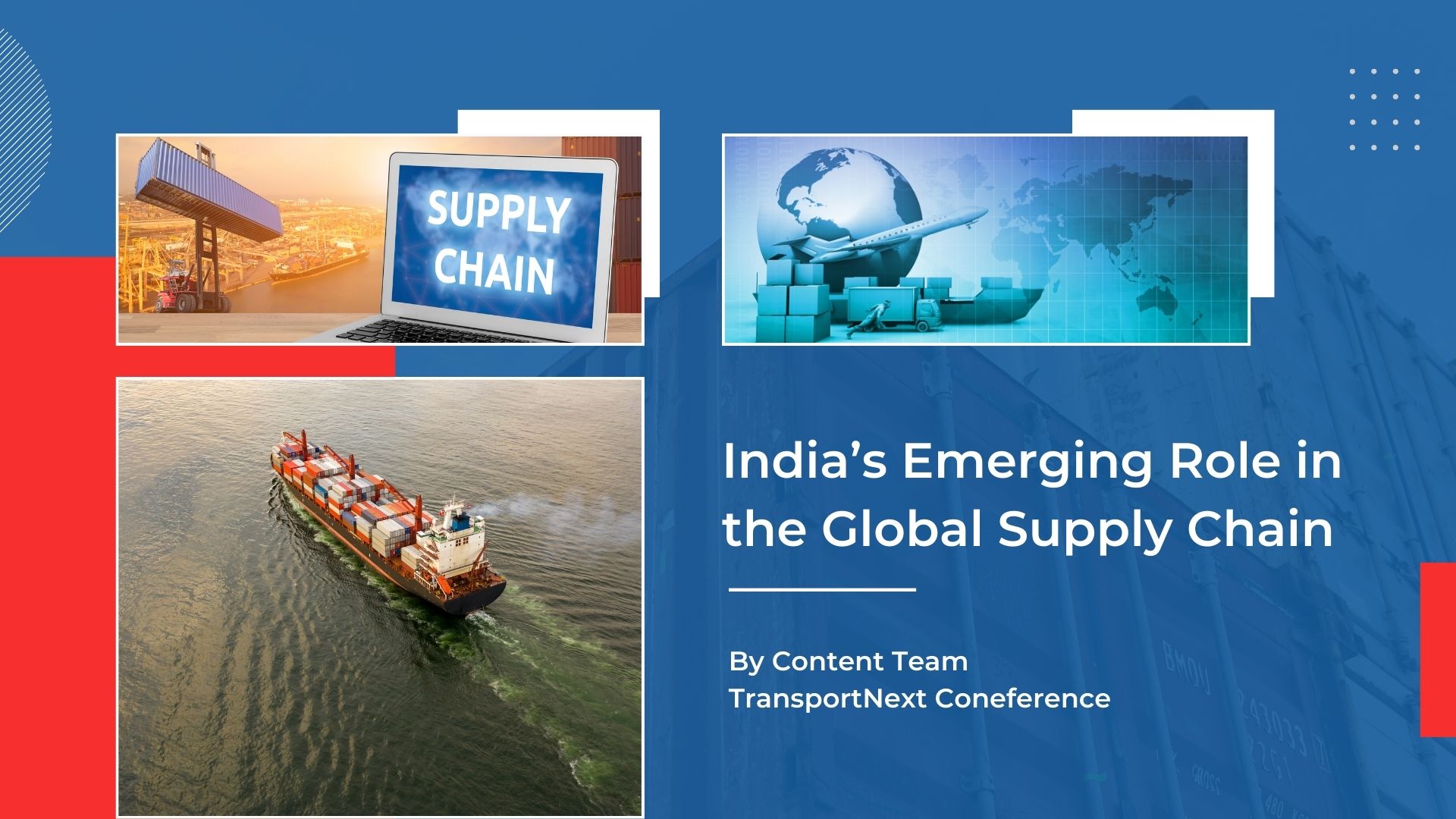India’s Emerging Role in the Global Supply Chain

India’s Global Supply Chain
“The “Global Supply Chain” refers to the interconnected network of organizations, resources, activities, and technologies involved in the production, distribution, and delivery of goods and services on a worldwide scale. It encompasses every stage of the product lifecycle, from raw material sourcing to final consumption, and involves coordination between suppliers, manufacturers, distributors, retailers, and customers across different countries and regions. The efficiency and resilience of the global supply chain impact the availability, cost, and quality of products, influencing economic growth, trade patterns, and consumer behavior on a global scale.”
According to the India Review, India is gaining prominence as a reliable option for manufacturers and supply chain diversification due to its large workforce and consumer market, competitive operational expenses, and strong ties to major global markets. Moreover, the country’s resilient economy, streamlining of business processes, and increasing receptiveness to foreign investment in various industries add to its attractiveness. Collectively, these elements establish India as a rising hub of international trade set to experience substantial expansion in the foreseeable future.
Table of Contents

Global Supply Chain
Indian Government Incentives that Support Manufacturing:
Several well-known companies such as FedEx, Foxconn, and Apple, as well as various prominent manufacturers in the electronics, aerospace, and medical device industries, are experiencing significant expansion in their operations within India. This growth is largely attributed to a range of government incentives aimed at bolstering India’s position in the global supply chain. The National Policy on Electronics (NPE), introduced in 2019, is designed to position India as a key global center for electronics manufacturing. This policy focuses on fostering the development of critical components such as semiconductor chips, graphics chips, and motherboard chipsets, thereby enhancing India’s electronics sector’s competitiveness on a global scale.
Furthermore, the Production Linked Incentive (PLI) program for large-scale electronic manufacturing offers financial incentives aiming to spur domestic production and attract substantial investments in electronic components and semiconductor packaging. These incentives have now been extended to encompass 14 additional industries, further bolstering India’s manufacturing landscape.
Industry Focus Areas for India Manufacturing:
India’s manufacturing sector has seen remarkable growth and diversification, significantly contributing to the country’s economic development.
Advancements in Aerospace and MedTech Industries in India
In the aerospace sector, India focuses on the manufacture of aircraft, spacecraft, and related components for both military and commercial applications. The industry benefits from a skilled workforce, technological advancements, and supportive government initiatives. Increasing collaborations and partnerships with international aerospace companies are driving growth and recognition in the global supply chain.
The medical technology (MedTech) industry is expanding rapidly. For instance, Boston Scientific established its first facility in Gurugram in 2016 and launched its second R&D center in Pune in 2023, making India home to its second-largest R&D centers outside the USA. Companies like Trivitron Healthcare and Opto Circuits India Ltd. produce a wide range of medical equipment and devices for global healthcare markets, underscoring the sector’s growth and importance in the global supply chain.
In the automotive industry, major players like Tata Motors, Mahindra & Mahindra, and Maruti Suzuki are manufacturing a diverse range of vehicles, including cars, motorcycles, commercial trucks, and buses. This diversity in production positions India as a significant player in the global automotive industry and strengthens its position in the global supply chain.
India is also implementing strategic initiatives to bolster its manufacturing capabilities and international commerce. The “Make in India” initiative, launched in 2014, aims to facilitate investment, foster innovation, enhance skill development, protect intellectual property, and build top-tier manufacturing infrastructure. This initiative is designed to create jobs and attract foreign investment, directly impacting 25 sectors, including railways, defense, insurance, and medical devices, thus influencing the global supply chain.
One key area is Digital Transformation and AI Integration. By adopting AI and data analytics, companies like Tata Steel have improved their supply chain management by predicting demand, managing inventory, and optimizing logistics. AI-driven solutions are particularly valuable for dynamic supply chain management, reducing risks, and improving supplier reliability and agility in the global supply chain.
Advancements in Warehouse Automation and Local Manufacturing Initiatives
Automation and Warehouse Management is another focus area. Manufacturers are increasingly using advanced Warehouse Management Systems (WMS) to address challenges such as high warehouse rents and storage space shortages. For instance, Flipkart, one of India’s largest e-commerce companies, has implemented robotics and automation in its warehouses to optimize storage, reduce errors, and improve labor productivity. This integration enhances overall global supply chain efficiency by speeding up goods movement and minimizing bottlenecks.
Efforts towards Local Sourcing and Import Substitution are gaining momentum as well. The government’s Production Linked Incentive (PLI) scheme aims to boost local manufacturing in sectors like electronics, pharmaceuticals, and chemicals. For example, Dixon Technologies, a leading electronics manufacturer, has significantly increased its domestic production capacity, reducing dependence on imports and strengthening local supply chains.
Sustainable Practices and Renewable Energy are becoming integral to global supply chain strategies. Incorporating sustainability not only reduces carbon footprints but also stabilizes energy supply chains. Companies like ReNew Power are investing heavily in renewable energy sources such as solar and wind power to create sustainable and resilient supply chains [source].
Workforce Training for Effective Supply Chain Management
Addressing the Skill Development and Workforce Training gap is crucial for effective supply chain management. Initiatives to upskill the workforce in digital technologies, AI, and advanced manufacturing processes are critical. Bharat Forge, a leading forging company, has invested in training programs to ensure its workforce is adept at utilizing these advanced technologies, maintaining efficient supply chain operations.
Lastly, Infrastructure Development remains a key priority. Continued investment in physical and digital infrastructure is vital for robust supply chain networks. Enhancements in logistics, transportation, and digital connectivity facilitate smoother and more reliable supply chain operations. Reliance Industries, for example, has heavily invested in infrastructure projects to support its vast manufacturing and distribution network.
These focus areas highlight India’s dynamic and diverse manufacturing ecosystem, poised for continued growth and increased global integration.
Why Businesses Relocate to India
A recent webinar titled “Why India is the Next Manufacturing Hub” highlighted several compelling reasons why foreign businesses are increasingly choosing India for their manufacturing operations.
Government Incentives:
Central and State Efforts: Both central and state governments in India are actively incentivizing manufacturing growth. States are even competing to attract foreign investment, offering various benefits and incentives.
Focus on Manufacturing:
Ongoing Commitment: There is a strong, ongoing commitment to enhancing the manufacturing sector. Panelists agreed that this focus will persist, with future governments expected to continue substantial investments in manufacturing.
Infrastructure Investment:
Heavy Investment: India is making significant investments in infrastructure, which is anticipated to further accelerate. This infrastructure development is crucial for supporting large-scale manufacturing and efficient supply chains.
Targeted Investments:
Special Economic Zones: Certain industries, especially those involving semiconductors and fabrication plants, benefit from targeted investments and special economic zones designed to foster industry-specific growth.
Pro-Business Environment vs. Bureaucracy:
Tension Exists: There are ongoing tensions between traditional bureaucratic processes, which can be slow, and initiatives like ‘Invest India,’ which aim to streamline operations and enhance the ease of doing business in the country.
Educational System:
Top-Tier Schools: India’s top-tier educational institutions produce highly skilled, employment-ready talent.
Gap Bridging:
Gap Bridging: Despite a gap between top-tier and second-tier schools, there is substantial collaboration between industries and universities to bridge this gap and ensure a steady supply of qualified professionals.
These insights underscore India’s strategic efforts to become a leading global manufacturing hub, driven by government support, infrastructure development, targeted investments, and an improving business environment.
India’s manufacturing growth, particularly in electronics, is significantly influenced by changing consumer demands. Consumers are increasingly seeking high-quality products with advanced features at competitive prices. India’s ability to provide a wide range of electronics at attractive price points drives this demand, benefiting consumers directly through cost savings. In the aerospace sector, India is exceptionally well-positioned due to its robust infrastructure, strategic manufacturing partnerships, and substantial government incentives. These factors have led to heavy investments from well-known aerospace companies, capitalizing on India’s advantageous position.
Companies are increasingly choosing India over other regions due to its lower tariffs and competitive landed costs. India offers a tariff rate of around 3%, compared to China’s 30%, making it an attractive destination for businesses. Additionally, India’s lower labor costs, strategic geographic location for trade across Southeast Asia, the Middle East, and Europe, and numerous trade agreements that reduce tariffs, all contribute to smoother and less expensive import and export processes. Improved logistics efficiency and reduced transportation costs further enhance India’s appeal by lowering the total landed cost for businesses operating in the region.
India is increasingly becoming a significant player in global manufacturing, a trend anticipated to expand in the future, according to the Business Standard. The country provides numerous benefits such as lower tariffs, decreased landed costs, and specific incentives in different sectors, making it an attractive choice for diversifying international supply chains.
During conversations with supply chain experts, it is apparent that adaptability and cross-border activities are vital for triumph in the current dynamic global economy. Due to its strategic advantages, India is a promising initial step for companies aiming to strengthen their supply chain adaptability and durability. However, sustained investment in infrastructure, reforms in logistics, and proactive measures to address challenges like bureaucratic hurdles and regulatory complexities are imperative to fully realize India’s promise as the ultimate hub in the supply chain industry.
India’s rise in the supply chain industry is significantly bolstered by its adoption of Industry 4.0 strategic benefits and a skilled workforce. Embracing advanced technologies such as automation, IoT, AI, and data analytics, India is enhancing operational efficiencies, reducing costs, and improving the agility and resilience of its supply chains. This technological advancement, coupled with a large and increasingly skilled workforce, enables India to offer a competitive edge to global businesses.
The strategic integration of these elements positions India not only as a manufacturing powerhouse but also as a critical player in the global supply chain network. To sustain this momentum, continued investment in education, technology, and infrastructure is essential, ensuring that India remains at the forefront of the evolving global supply chain landscape. As global trade continues to evolve, the supply chain industry will need to adapt and innovate to meet the demands of a dynamic market.
Logistic Events are vital for gaining insights into industry practices and innovations, facilitating meaningful connections, and opening doors for shared resources. An annual premier worldwide event, the TransportNext Awards, Conference, and Expo is organized by Next Business Media in Singapore and the United States. The transport and logistics community throughout the rest of the world are served by the Singapore edition. By taking advantage of Singapore’s advantageous position, it offers a forum for global cooperation and knowledge sharing.
TransportNext Singapore provides enlightening talks, engaging workshops, and a large expo. It also highlights innovative solutions and promotes strategic alliances. The TransportNext Awards, which honor achievements in the sector, are the focal point. This Logistics event guarantees an unmatched networking and growth-promoting experience because of its global reach and dedication to Logistics and Transportation industry improvement.





